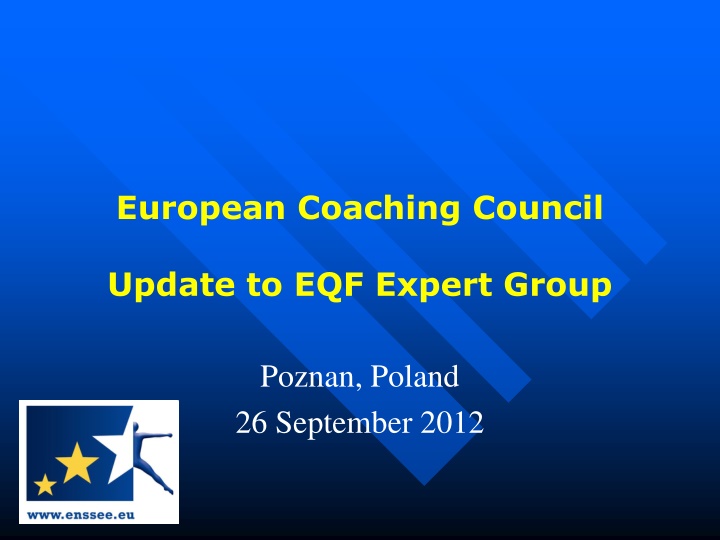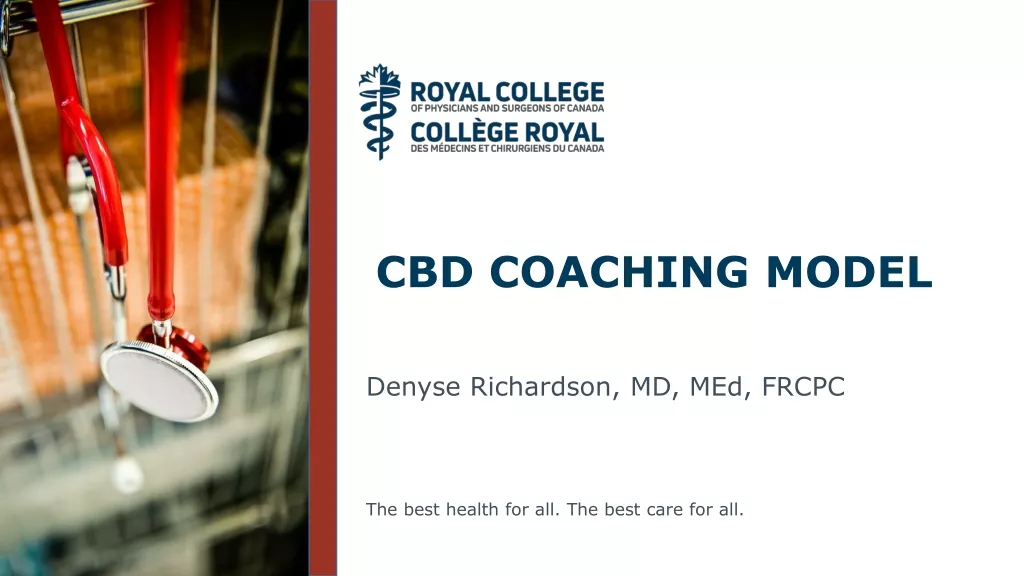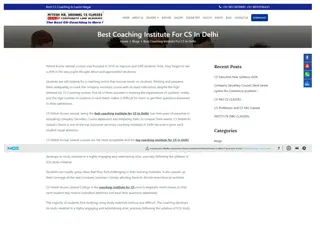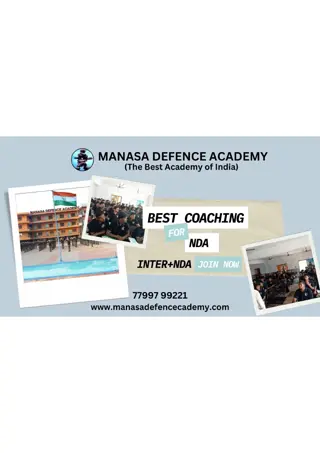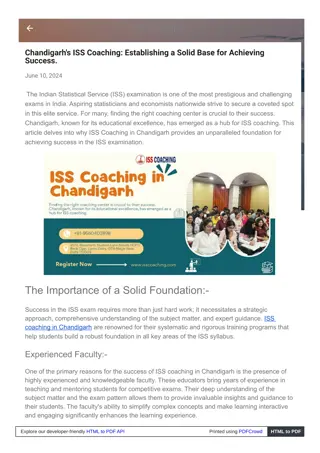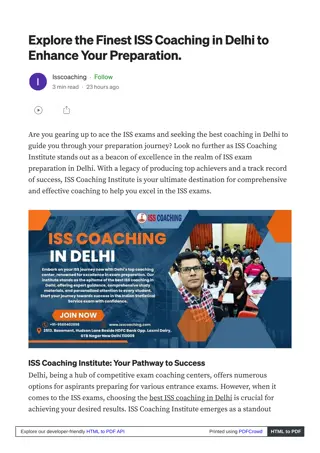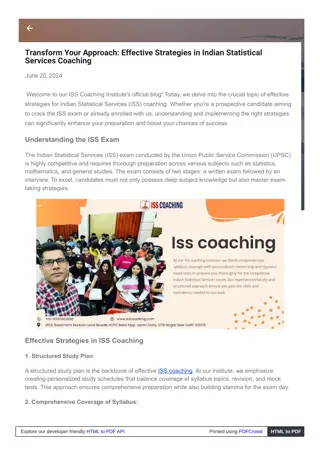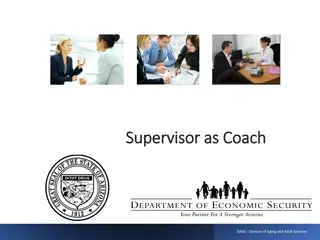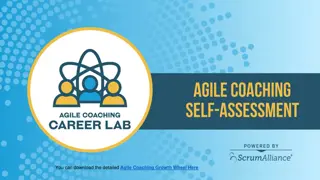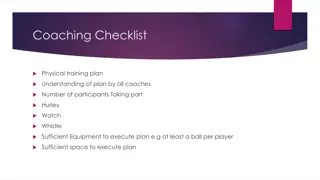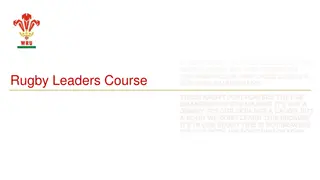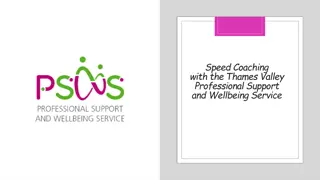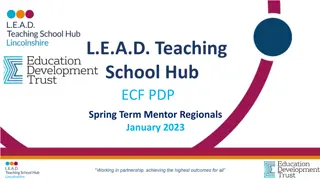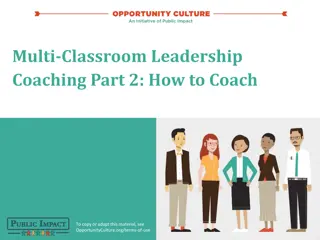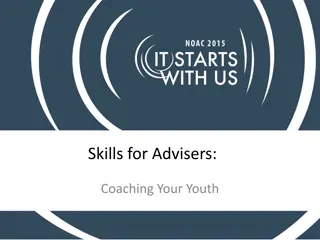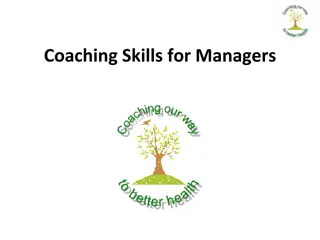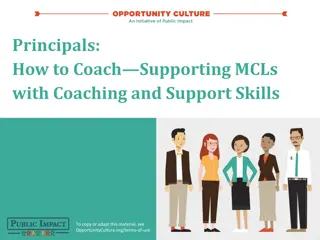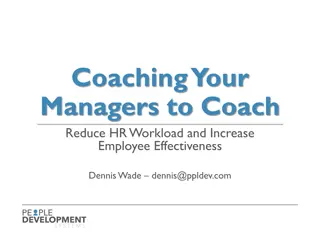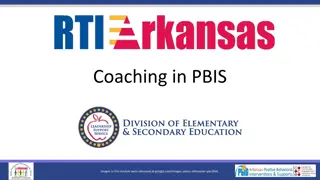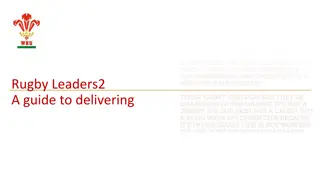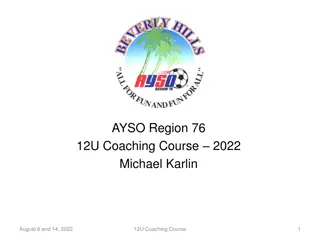European Coaching Council Update and Mission
The European Coaching Council, established in Lausanne in September 2003, works towards elevating coaching as a recognized profession across Europe. The council's mission is to facilitate the development of coaching as a profession in Europe and enhance its role in sports. With a dedicated executive committee and affiliation with the International Council for Coaching Excellence (ICCE), the ECC aims to support global coaching development. The council's initiatives include enhancing the voice of coaches and implementing frameworks for recognizing coaching competence and qualifications.
Download Presentation

Please find below an Image/Link to download the presentation.
The content on the website is provided AS IS for your information and personal use only. It may not be sold, licensed, or shared on other websites without obtaining consent from the author.If you encounter any issues during the download, it is possible that the publisher has removed the file from their server.
You are allowed to download the files provided on this website for personal or commercial use, subject to the condition that they are used lawfully. All files are the property of their respective owners.
The content on the website is provided AS IS for your information and personal use only. It may not be sold, licensed, or shared on other websites without obtaining consent from the author.
E N D
Presentation Transcript
European Coaching Council Update to EQF Expert Group Poznan, Poland 26 September 2012
Update 1. European Coaching Council 2. European Framework for the Recognition of Coaching Competence and Qualifications 3. Rio Maior Convention 4. International Sport Coaching Framework 5. Next steps
1. European Coaching Council
European Coaching Council Established in Lausanne (Sept 2003)
European Coaching Council Mission The ECC will act as a sub-committee of ENSSEE and work to facilitate the development of coaching as a profession across Europe and to elevate coaching in Europe to a profession acknowledged as central to the development of sport and the fulfilment of individual potential.
Executive Committee Jacqueline Braissant; Miguel Crespo (Vice- chair); Jose Curado; Pat Duffy (Chair); Michael McGeehin; Jan Minkhorst; Ladislav Petrovic (Secretary); Frederic Sadys ECC is also the European division of ICCE
International Council for Coaching Excellence (ICCE) Mission: To lead and support the global development of coaching as a profession and to enhance the quality of coaching at every level in sport, guided by the needs of members, federations, nations and key partners. Vision: A global community of coaching, where coaching is recognised as a profession and where skilled, qualified coaches are available to children, players, athletes and adult participants in line with their needs and stage of development
A project to enhance the voice of the coach and further evolve the structure of the European Coaching Council. January 2012 to March 2013.
2. European Framework for the Recognition of Coaching Competence and Qualifications
Outline of EU 5 Level Structure Three levels of vocational training in the directives on the two general systems of recognition of diplomas LEVEL 3 -First general system diploma -Post-secondary training of more than 3 years duration LEVEL 2 -2nd general system diploma -Post-secondary training of less than 3 years duration LEVEL 1 -2nd general system certificate -Secondary-education training Five levels of vocational training in the European structure LEVEL 5 2400 hours (LEVEL 5) LEVEL 4 Min. 600 hours (LEVEL 4) LEVELS 3, 2, 1 Min. 300 hours (LEVELS 3, 2, 1)
REVIEW OF EU 5-LEVEL STRUCTURE
AEHESIS - Aligning an European Higher Education Structure in Sport and Science - project
Review Group Pat Duffy/ UK (Chair) Corrado Beccarini/ Italy Jacqueline Braissant (FEI) Bruce Cook/Mark Harrington (IRB) Miguel Crespo/ITF and Spain Christophe Debove/ France Elio Locatelli (IAAF) Thierry Marique/Belgium Declan O Leary/Ireland Ladislav Petrovic/ Hungary Jos Rodrigues/ Portugal Agoston Schulek (EAA) Ton Van Linder (EHF) External advisor: John Bales President of the International Council for Coach Education
OUTLINE FRAMEWORK REVIEW OF COACHING QUALIFICATIONS / CURRICULUM BUILDING 1. EMPLOYMENT 2. COMPETENCES 3. EDUCATION- TRAINING-CERTIFICATION III. ACTIVITIES IV. LEARNING OUTCOMES V. COMPETENCES I. PROFESSIONAL AREA II. STANDARD OCCUPATION VI. CURRICULUM MODEL The athlete and other people TRAINING Coach of beginner sportspeople Child / junior / adult 1. ENTRY REQUIREMENTS Plan, Organise 1. SKILLS (FUNCTIONAL) KNOW-HOW Conduct, Evaluate Coach of Participation oriented sportspeople 2. CONTENTS / MODULES / UNITS The coach COMPETITION Coach of participation / sportspeople Child /junior / adult Plan, Organise 3. NR. OF CREDITS The sport Conduct, Evaluate COACHING A SPORT 2. KNOWLEDGE (COGNITIVE) KNOW WHAT 4. LEARNING METHODS Applied Sport Science Coach of talented ID / Competitive athletes Child / junior / adult MANAGEMENT Plan, Organize Plan, Organise 5. ASSESSMENT TYPES Conduct, Evaluate Conduct, Evaluate (i) Authonomy & responsibility Coach of performance oriented athletes Master Coach 6. RESOURCES Coach of full-time / high performance athletes (ii) Learning competence EDUCATION 3. PERSONAL & PROFESSIONAL COMPETENCES Senior Coach Plan, Organise 7. QUALITY CONTROL Conduct, Evaluate (iii) Communication & social competence Coach 8. TUTORS Long-term sports people development (*) Apprentice Coach 4. KEY (iv) Professional & vocational competence COMPETENCES 9. CAREER PERSPECTIVES Long-term Coach Development (*)
EFRCCQ Performance Oriented Athletes/Teams Participation Oriented Sportspeople Participation Oriented High Beginners Talents Performance Master Coach .. 7 National EQF Senior Coach - Levels Levels - Coach (1- 8) ( ) .. 3 Apprentice Coach
Rio Maior Convention The framework for the recognition of coaching competence and qualifications as proposed by the European Coaching Council in the Review of the 5-Level Structure is the European recognised reference point for the period 2008-11.
EFRCCQ reference point (15+ countries) and legislation (Portugal and Romania) and IF engagement
Reference point: mapping Germany (2008) Coach Education System in Germany Coaching role / reference point Level Certificate No. of lessons (at least) federation - based 5 Diploma - Coach 1.300 Master Coach Elite Sports 4 Coach Grade A 90 Senior Coach 3 Coach Grade B 60 Coach 2 Coach Grade C 120 Apprentice coach 1 Assistent Coach 30
Stages of Athlete Development and the IAAF CECS (Locatelli, 2008) and see Duffy, Crespo and Petrovic, 2010 for comparison with EFRCCQ Academy Specialisation, Performance Multi-Events, Event Group Development, Specialisation, Performance Level IV Multi-Events, Event Group Development, Specialisation Level III Multi-Events, Event Group Development Level II Kid s Athletics, Multi-Events, Event Group Development Level I Stage 5 Performance Stage 4 Specialisation Stage 3 Event Group Development Stage 2 Multi-Events Stage 1 Kids Athletics
EFRCCQ The starting point for the International Sport Coaching Framework
4. International Sport Coaching Framework
The International Sport Coaching Framework A joint ICCE and ASOIF Project Key Features The purpose of the Framework is to provide an internationally recognised reference point for the education, development and recognition of coaches Definition of Sport Coaching: The Process of guided improvement and development in a single sport and at identifiable stages of development Coaching as a Blended Professional Area:: Professio nal Coaching Occupations and Domains Volunte er Pre- coach Core Functions of the Coach Coaching Role Descriptors Shaping the environment Conducting Practice and Competition Vision and Strategy Master ( or Head) Coach Advanced ( or Senior) Coach Coach Reading and Reacting to the Field Relationship Building and Influencing Reflecting and Learnng Coaching Assistant For more info, visit www.icce.ws
ISCF Process Formation of Joint Working Group (2011) Version 1.1 (August 2012) Further development and consultation Version 1.2 (September 2013) International Convention Quadrennial reviews
5. Next steps in a European context
EFRCCQ next steps Extend the status of the Framework for the period 2012-2013 Intensify work on the application of the Framework (including NQF and EQF links) Refine and re-name to the European Sport Coaching Framework by 2014, fully aligned with the International Sport Coaching Framework
Summary 1. European Coaching Council 2. European Framework for the Recognition of Coaching Competence and Qualifications 3. Rio Maior Convention 4. International Sport Coaching Framework 5. Next steps
European Coaching Council Update to EQF Expert Group Poznan, Poland 26 September 2012
